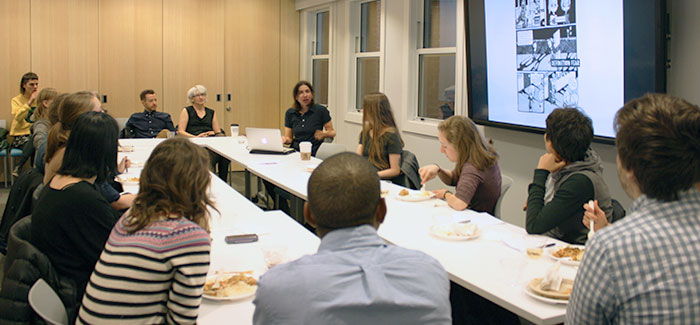
During the “How to Write Anything” workshop with author Ariel Schrag (center, wearing a dark polo shirt). (Photography by Ingrid Gonçalves, AB’08)
Ariel Schrag discusses her journey from fact to fiction.
Ariel Schrag’s first comic, Awkward, is about ninth grade. Not ninth grade in general, but Schrag’s actual experiences with sex, drugs, and school—complete with her friends’ real names.
“What could be more interesting than the truth?” she said, describing her creative approach at the time.
Schrag told the true story of her evolution from high school cartoonist to television writer to novelist at the “How to Write Anything” workshop, hosted by the University of Chicago Center for the Study of Gender and Sexuality on November 7.
[[{"type":"media","view_mode":"media_original","fid":"2058","attributes":{"alt":"","class":"media-image","height":"154","typeof":"foaf:Image","width":"460"}}]]
Every summer in high school, Schrag created a new comic reflecting on her previous year, including some verbatim transcripts of her conversations. “It was like an obsession,” she said of her quest to document her life in real time. Despite their diary-like feel, all four of Schrag’s comics underwent a thoughtful editing process as she looked back on the school year each summer.
Working in television was a big adjustment for Schrag, who went on to write for Showtime’s The L Word and HBO’s How to Make It in America. But it was also a creative breath of fresh air. Collaborating with other writers on a diverse cast of characters gave her a break from the autobiographical nature of her early work.
In fiction Schrag found a more flexible, perhaps more liberating, way to shed light on the truth. The protagonist in her first novel, Adam, is a high school boy. The book allowed her to “inhabit an experience” she thought about often as a teen.
“I always doodled men,” said Schrag, whose dark polo shirt, bare face, and laissez-faire hair suggest a boyish style. “I found Adam’s voice surprisingly easy to write, though I wonder what cis males would think about it.”
Adam has attracted some controversy. In it an attractive woman mistakes the protagonist for a trans male—a misunderstanding he decides to roll with. “Obviously that’s not something I condone,” Schrag laughed. “It’s a shitty thing to do.”
Schrag admits her desire to become a novelist was inspired in part by jealousy. Everyone else was always talking about the books they were writing. She wanted a book of her own.
“The thing that makes you anxious, that makes you jealous,” Schrag said, “is the thing you should be doing.”
